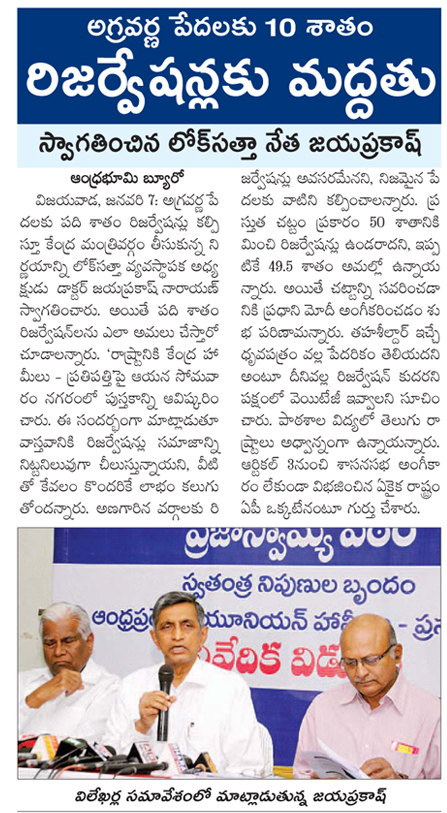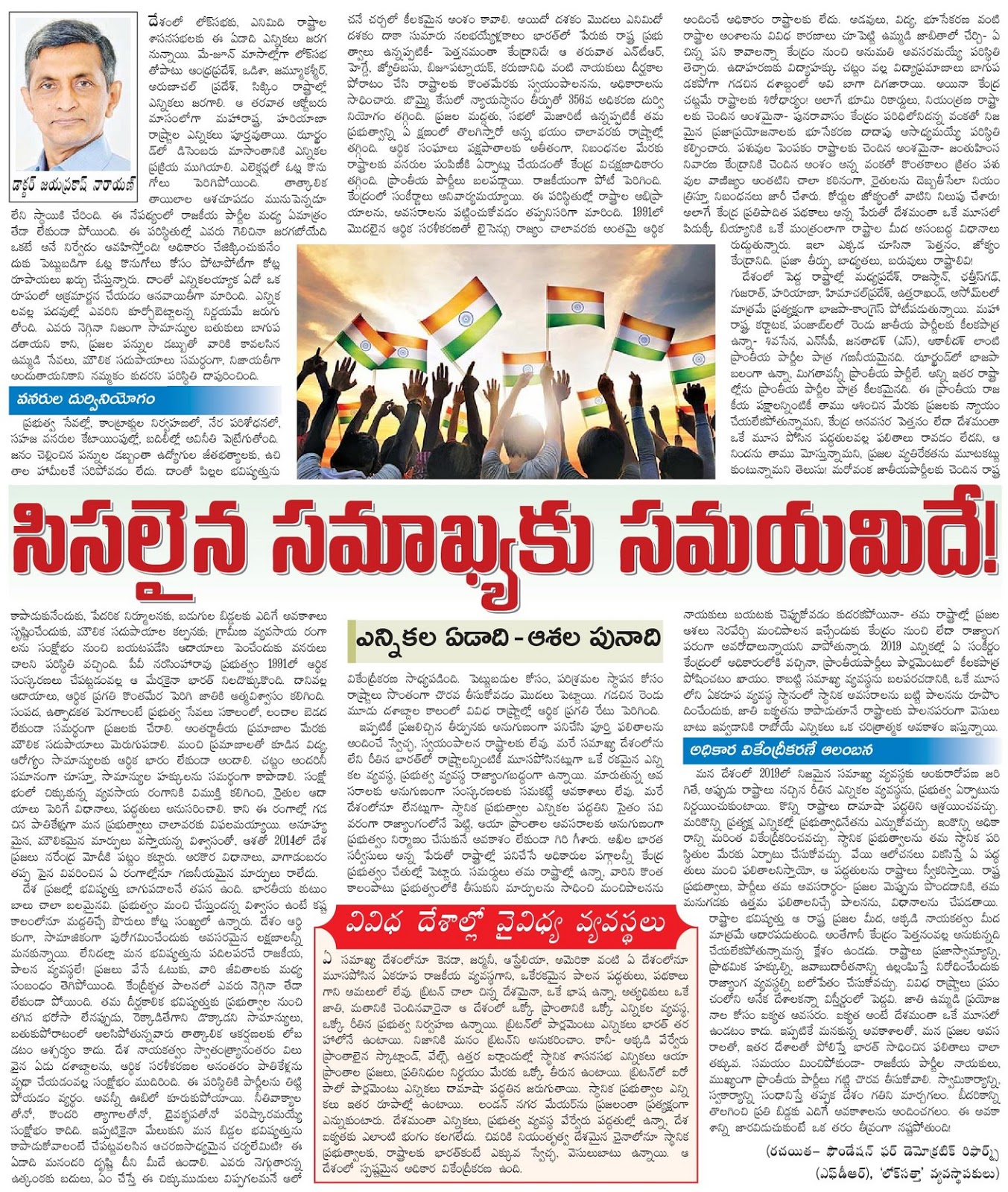Thursday, January 31, 2019
Wednesday, January 30, 2019
Monday, January 28, 2019
Saturday, January 26, 2019
దేశం గర్వించదగిన నేత పీవీ
Labels:
NamastheTelangana,
telugu
మన్మోహన్ కు పీవీ స్మారక అవార్డు
Labels:
AndhraJyothy,
telugu
లోక్ సత్తా ముసాయిదా మేనిఫెస్టో విడుదల
Labels:
AndhraJyothy,
telugu
Thursday, January 24, 2019
నివురుగప్పిన శక్తిని బయటకు తీయండి
Labels:
AndhraBhoomi,
telugu
Monday, January 21, 2019
The 10% quota for poor will not end deprivation - Jayaprakash Narayan
Reservation will be futile unless we improve the quality of school education for the poor and disadvantaged sections
In contemporary India, no other issue captures the imagination of the public as much as reservations. The agitations of the Patidars, Jats, Marathas, Kapus, Muslims and various other groups for quotas in higher education and government jobs have now become endemic. The extraordinary speed with which the Parliament approved the 103rd amendment to the Constitution providing for 10% reservation for economically backward sections shows that parties are sensitive to public mood and want to please all groups — hoping that offering all sections a slice is the best way to put a stop to further quotas.
In this backdrop, we need to address five questions. One, will the amendment pass judicial scrutiny? Two, are the criteria identified by the government for economic backwardness satisfactory? Three, will this step rationalise reservations and ensure fairness and harmony? Four, can reservations fulfil the objectives of providing opportunity and social justice? And five, can government employment be an effective tool for social justice?
First, the legal issues. The amendment faces two hurdles: the basic structure of the doctrine and the 50% cap on reservations. Supreme Court verdicts have repeatedly held that Articles 15 and 16 are part of the basic structure of the Constitution. The court , therefore, has the power to review the amendment. If it is held valid, then the larger question of a 50% cap needs to be addressed. The court has rightly held that equality of treatment is the norm, and reservation for disadvantaged groups should be the exception limited to a maximum of 50%. It may be difficult for the court to accept that the exception can extend to 60%.
If the amendment passes both these tests, then the operational issues will have to be addressed. The government’s proposal of a ~8 lakh annual household income is too high a ceiling, and probably covers over 90% of the population. Given our notorious laxity and corruption, it is very hard to exclude groups on the basis of income, especially the employees outside the organised sector. In addition to a more reasonable income cap of, say ~2.5 lakh, we need to identify reliable criteria for eligibility. Parental education (school-level or illiterate), and the school the child attended (government school or low-end private school of, say, with an annual fee less than ~6,000) are far more reliable in identifying deprivation and eligibility.
Our current model of reservation has led to enormous distortions and heartburn. The amendment is only palliative, and fails to rationalise the system. Now, most of real benefits of prized higher education opportunities or high-end government jobs go mostly to children of families, which benefited significantly from reservations. The poor among those classes of people have little opportunity to compete. Excluding the creamy layer in all reservations is vital to spread opportunities to the truly disadvantaged. The real challenge of deprivation is the failure of school education, which is the foundation of opportunity, equity and capacity building in any society. The recently released ASER surveys show that in rural India 27% of children in 8th standard cannot read a 2nd standard level text. Reservation in higher education and public employment as a tool of social justice is futile unless we dramatically improve real outcomes of school education for the poor and disadvantaged sections.
Finally, out of the 400 million workers in India, the organised sector comprises less than 10%. Of the organised workers, government and the public sector employ fewer than half. But public sector workers are generally paid 2-4 times the market wages, have lifetime job security, are largely unproductive and unaccountable. How can employment in less than 5% of workforce be the solution to the problem of deprivation? Our women’s participation in labour force is only 27%—one of the lowest in the world. Can there be upward mobility or poverty reduction without creation of hard, wage-earning, productive jobs? Given this, the debate is oblivious of the needs of India. Our political discourse and public policies are increasingly divorced from people’s lives.
Courtesy: Hindustan Times
In contemporary India, no other issue captures the imagination of the public as much as reservations. The agitations of the Patidars, Jats, Marathas, Kapus, Muslims and various other groups for quotas in higher education and government jobs have now become endemic. The extraordinary speed with which the Parliament approved the 103rd amendment to the Constitution providing for 10% reservation for economically backward sections shows that parties are sensitive to public mood and want to please all groups — hoping that offering all sections a slice is the best way to put a stop to further quotas.
In this backdrop, we need to address five questions. One, will the amendment pass judicial scrutiny? Two, are the criteria identified by the government for economic backwardness satisfactory? Three, will this step rationalise reservations and ensure fairness and harmony? Four, can reservations fulfil the objectives of providing opportunity and social justice? And five, can government employment be an effective tool for social justice?
First, the legal issues. The amendment faces two hurdles: the basic structure of the doctrine and the 50% cap on reservations. Supreme Court verdicts have repeatedly held that Articles 15 and 16 are part of the basic structure of the Constitution. The court , therefore, has the power to review the amendment. If it is held valid, then the larger question of a 50% cap needs to be addressed. The court has rightly held that equality of treatment is the norm, and reservation for disadvantaged groups should be the exception limited to a maximum of 50%. It may be difficult for the court to accept that the exception can extend to 60%.
If the amendment passes both these tests, then the operational issues will have to be addressed. The government’s proposal of a ~8 lakh annual household income is too high a ceiling, and probably covers over 90% of the population. Given our notorious laxity and corruption, it is very hard to exclude groups on the basis of income, especially the employees outside the organised sector. In addition to a more reasonable income cap of, say ~2.5 lakh, we need to identify reliable criteria for eligibility. Parental education (school-level or illiterate), and the school the child attended (government school or low-end private school of, say, with an annual fee less than ~6,000) are far more reliable in identifying deprivation and eligibility.
Our current model of reservation has led to enormous distortions and heartburn. The amendment is only palliative, and fails to rationalise the system. Now, most of real benefits of prized higher education opportunities or high-end government jobs go mostly to children of families, which benefited significantly from reservations. The poor among those classes of people have little opportunity to compete. Excluding the creamy layer in all reservations is vital to spread opportunities to the truly disadvantaged. The real challenge of deprivation is the failure of school education, which is the foundation of opportunity, equity and capacity building in any society. The recently released ASER surveys show that in rural India 27% of children in 8th standard cannot read a 2nd standard level text. Reservation in higher education and public employment as a tool of social justice is futile unless we dramatically improve real outcomes of school education for the poor and disadvantaged sections.
Finally, out of the 400 million workers in India, the organised sector comprises less than 10%. Of the organised workers, government and the public sector employ fewer than half. But public sector workers are generally paid 2-4 times the market wages, have lifetime job security, are largely unproductive and unaccountable. How can employment in less than 5% of workforce be the solution to the problem of deprivation? Our women’s participation in labour force is only 27%—one of the lowest in the world. Can there be upward mobility or poverty reduction without creation of hard, wage-earning, productive jobs? Given this, the debate is oblivious of the needs of India. Our political discourse and public policies are increasingly divorced from people’s lives.
Courtesy: Hindustan Times
Labels:
english
నాయకత్వ లక్షణాలు అభివృద్ధి చేసుకోవాలి
Labels:
NavaTelangana,
telugu
Wednesday, January 16, 2019
Lok Satta Times Jan 16th-31st, 2019
Lok Satta Times Jan 16th-31st, 2019 can be downloaded from the following link.
http://www.loksatta.org/documents/lstimes/lstimes-2019-01-16-31.pdf
http://www.loksatta.org/documents/lstimes/lstimes-2019-01-16-31.pdf
Tuesday, January 8, 2019
పోలవరం మినహా ఇవ్వాల్సింది 75 వేల కోట్లు
Labels:
AndhraJyothy,
telugu
సమాఖ్య వ్యవస్థను కాపాడుకోవాలి: జేపీ
Labels:
PrajaSakthi,
telugu
Monday, January 7, 2019
Saturday, January 5, 2019
ప్రత్యామ్నాయ రాజకీయాలే మా లక్ష్యం: జేపీ
Labels:
AndhraJyothy,
telugu
Friday, January 4, 2019
Thursday, January 3, 2019
Tuesday, January 1, 2019
Subscribe to:
Posts (Atom)






















































